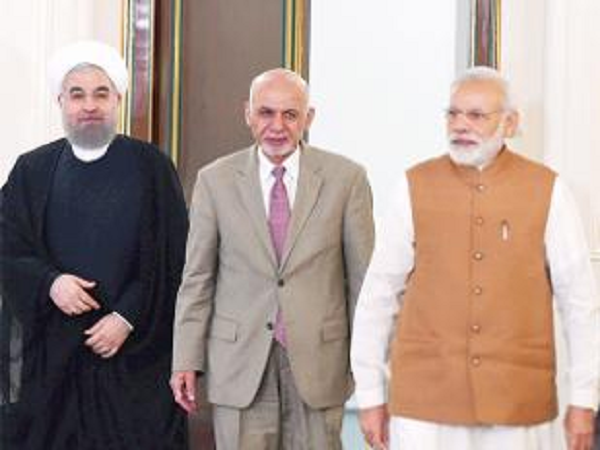
by admin | May 25, 2021 | News, Politics
 Tehran, (IANS) Prime Minister Narendra Modi on Monday said the agenda for economic engagement with Iran and Afghanistan is a priority for India and the Chabahar transport and transit agreement “can alter the course of history” of the region.
Tehran, (IANS) Prime Minister Narendra Modi on Monday said the agenda for economic engagement with Iran and Afghanistan is a priority for India and the Chabahar transport and transit agreement “can alter the course of history” of the region.
“The agenda for economic engagement is a clear priority for us. We stand together in unity of our purpose,” Modi said in a joint media conference with Iranian President Hassan Rouhani and Afghan President Ashraf Ghani following the signing of the trilateral agreement on the Chabahar port for transport and transit corridor.
“Today, we are witnessing a creation of history… “Not just for the people of our three countries, but for the entire region,” he said.
Pitching to carve out “new routes of peace and prosperity” of the three countries, Modi said: “It is our common goal. We want to link with the world.”
The prime minister said the Chabahar transport and transit corridor “would spur unhindered flow of commerce throughout the region”.
He said the inflow of capital and technology could lead to new industrial infrastructure in Chabahar.
“This would include gas-based fertiliser plants, petrochemicals, pharmaceuticals and IT,” the prime minister said.
“The key arteries of the corridor would pass through the Chabahar port of Iran.”
He said Afghanistan would now get an assured, effective, and a more friendly route to trade with the rest of the world.
“The arc of economic benefit from this agreement would extend beyond our three nations,” Modi said.
Stating that its reach could extend to the Central Asian countries, he said that when linked with the International North South Transport Corridor, “it would touch South Asia at one end and Europe at another”.
“And, studies show that as compared to the traditional sea routes, it could bring down the cost and time of the cargo trade to Europe by about 50 percent,” he said.
“Over time, we could even look to connect it with the strong sea and land based routes that India has developed with the Indian Ocean region and Southeast Asia.”
The prime minister said the global economy was yet to fully come out of uncertainty and weakness.
“Our present growth and future prosperity is under threat from the spread of radical ideas and physical terror,” he said.
He said the Chabahar corridor would be a “corridor of peace and prosperity for our peoples. Motives of economic growth, and empowerment would drive it. It would break barriers among our nations and encourage new benchmarks of people-to-people contacts”, and help lead to a friendly and healthy neighbourhood.
He said the three countries — India, Iran and Afghanistan — were estimated to have more than 60 percent of their population under 30 years of age.
“We want them to walk the road to knowledge and skills; industry and enterprise,” he stated.
Modi expressed confidence that the economic fruits of the Chabahar agreement would expand trade, attract investment, build infrastructure, develop industry and create jobs for our youth.
“The agreement will strengthen our ability to stand in mutual support against those whose only motto is to maim and kill the innocents,” he said.
On his part, President Rouhani said that through this agreement, Tehran, Delhi and Kabul have sent the message that the path of progress can be achieved through cooperation and utilisation of regional resources.
“With our joint investments in Chabahar, we can connect India with Afghanistan, Central Asia and the CIS countries,” he said.
He also said that there was room in the agreement for other countries to join in.
Speaking on the occasion, Afghan President Ghani said Asia was changing and it was moving towards being an economic continent.
“We wanted to prove that geography is not our destiny. With our will we can change geography,” he said.
He also said that in the coming years, $60 trillion would be invested in infrastructure and most of it would be invested in Asia.
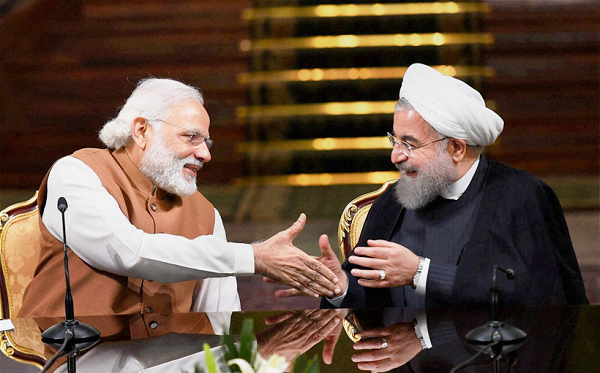
by admin | May 25, 2021 | News, Politics

PM Narendra Modi shakes hands with Iranian President Hassan Rouhani during a joint press conference after their meeting at the Saadabad Palace in Tehran, Iran, Monday. (Source: PTI photo)
Tehran, (IANS) Prime Minister Narendra Modi on Monday described India-Iran friendship as “as old as history” after the two sides signed 12 agreements, including three on development of the Chabahar port in this Persian Gulf nation for enhanced connectivity.
“India and Iran are not new friends. Our dosti is as old as history,” Modi said at a joint media conference with Iranian President Hassan Rouhani.
“Through centuries, our societies have stayed connected through art and architecture, ideas and traditions, and culture and commerce,” he said.
The prime minister pointed out that Iran was among the first countries to come forward in support after the 2001 Gujarat earthquake.
“Similarly, India is proud to have stood with the people of Iran during your difficult times,” he said.
Stating that he was impressed by Rouhani’s leadership and the clarity of vision, Modi said that Monday’s talks between the two countries focused on the full range of bilateral engagement.
“We exchanged views on the emerging regional situation and global issues of common concern,” he said.
“The agenda and scope of our partnership is truly substantial. The outcomes and agreements signed today open a new chapter in our strategic partnership.”
Modi also said that the welfare of the people of the two countries was guiding the broad-based economic ties.
“Expanded trade ties, deeper connectivity, including railways, partnerships in oil and gas sector, fertilisers, education and cultural sphere are driving our overall economic engagement,” he stated.
“The bilateral agreement to develop the Chahbahar port and related infrastructure, and availability of about $500 million from India for this purpose, is an important milestone. This major effort would boost economic growth in the region.”
Modi said that he was looking forward to signing of the trilateral transport and transit agreement between India, Iran and Afghanistan later on Monday.
“It will open new routes for India, Iran and Afghanistan to connect among themselves,” he aid.
The prime minister also said that India and Iran shared a crucial stake in peace, stability and prosperity of the region.
“We also have shared concerns at the spread of forces of instability, radicalism and terror in our region,” he said.
“We have agreed to consult closely and regularly on combating threats of terrorism, radicalism, drug trafficking and cyber crime. We have also agreed to enhance interaction between our defence and security institutions on regional and maritime security.”
Modi promised that he and Rouhani would spare no effort to work for the glorious future of the ties between India and Iran.
On his part, Rouhani said that Iran always attached great importance to its relationship with India.
“The economic relationship and cooperation between the two countries will become much bigger,” he said.
“The relationship will go beyond mere trade relationship. When we are talking of economic relationship, we are talking of Iran and the surrounding countries with a population of 400 million and india with a population of one billion.”
Connectivity, energy security and bilateral trade are on top of Modi’s agenda during his two-day visit which comes a little over a month-and-a-half after his trip to Saudi Arabia.
The prime minister, who arrived here on Sunday evening and offered prayers at a gurudwara, will also inaugurate an Indian cultural festival in Iran on Monday.
Modi will also hold talks with the country’s Supreme Leader, Ayatollah Sayyid Ali Hosseini Khamenei.
The prime minister’s visit comes four months after the sanctions on Iran over its nuclear programme were lifted and the international community is re-engaging with the nation.
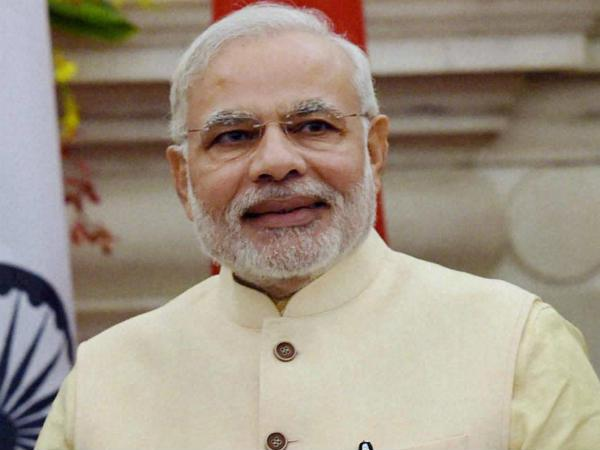
by admin | May 25, 2021 | Economy, News
 New Delhi, (IANS) Renewing calls for India to move towards a “cashless society”, Prime Minister Narendra Modi on Sunday said this was essential to curb black money in the country.
New Delhi, (IANS) Renewing calls for India to move towards a “cashless society”, Prime Minister Narendra Modi on Sunday said this was essential to curb black money in the country.
Exhorting citizens to begin using the “electronic technological” payments systems put in place, Modi in his ‘Mann ki Baat’ address over All India Radio said: “I urge fellow citizens to begin using the electronic modes of cashless transaction and illegal businesses will close down, black money will disappear.”
“Through electronic-technological means we can now both pay and receive money. The world is moving towards a cashless society,” he said.
The prime minister also said the move towards such a society was being enabled by the government’s JAM initiative — Jan Dhan Yojana, Aadhar and Mobile — to implement direct transfer of benefits.
“Through the JAM trinity, we can move towards a cashless society,” Modi said.
“RuPAY cards have been given with Jan Dhan accounts and in the coming days these will have credit and debit card facilities, to disincentivise cash transactions,” he added.
RuPAY cards were launched by the National Payments Corporation of India to address the needs of Indian consumers, merchants and banks.
The benefits of RuPay debit card are flexibility of the product platform and high levels of acceptance.
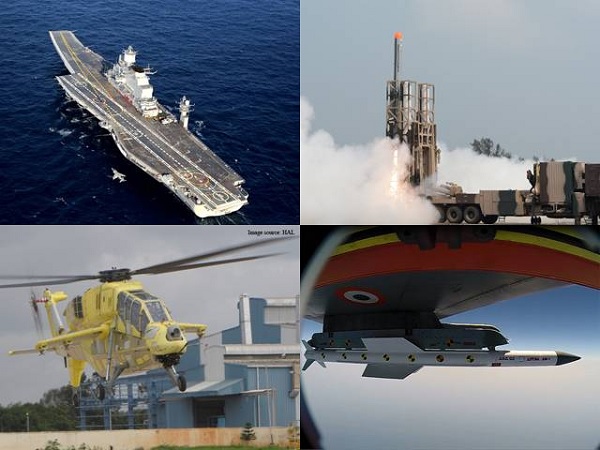
by admin | May 25, 2021 | Economy, News
 By Anjali Ojha
By Anjali Ojha
New Delhi : (IANS) As India focuses on enhancing domestic production of military hardware, a surge in its export was recorded in nine months to end-2015, with the net value touching almost $210 million (Rs.1,400 crore).
According to the annual report of the defence ministry, the Defence Public Sector Undertakings (DPSUs), Ordnance Factory Board (OFB) and the private sector companies exported products worth Rs.1,397 crore from April to December 2015. The final figures for the fiscal ending March 31 are yet to be tabulated.
Exports in the financial year 2014-15 were valued at Rs.994 crore.
“The trend in export shows phenomenal growth by the industry,” the defence ministry report said.
It also lauded the role of private companies in the defence sector, stating that the exports by the sector had shown “accelerated growth” by 12-14 companies.
The major destinations for defence exports from India include Afghanistan, Algeria, Belgium, Ecuador, Indonesia, Israel, Myanmar, Nepal, Oman, Romania, Russia, South Korea, Sudan, Vietnam and the UK.
Among the major items being exported are Offshore patrol vessels, spares for radars, Cheetal helicopters, turbo chargers and batteries, electronic systems, light engineering mechanical parts and personal protective items, which comprise articles like helmets, bulletproof jackets and other types of clothing.
The report also observed that the online system for NoCs (No Objection Certificates) which was started in November 2014 is working satisfactorily.
In August 2015, the Standard Operating Procedures (SOP) for issuing NOCs for export of military stores by public or private defence industry were also revised.
Under this, the requirement of an End User Certificate to be countersigned or stamped by the government authorities has been done away with for the export of items like parts, components or sub-systems.
As the government promotes participation of private sector in defence manufacturing, the report also said that the Department of Industrial Policy and Promotion has issued 319 Industrial Licences to 190 companies till January 2016.
Of these, 50 companies with 79 licences have started production.
The new Defence Procurement Procedure (DPP) envisages providing a boost to the ‘Make in India’ initiative, enhanced role for private sector, and promoting medium and small scale industries.
It also has a new category of Buy Indian — Indigenous Design Development and Manufacturing under which indigenously designed equipment with 40 percent content will be procured.
According to Sweden-based think-tank Stockholm International Peace Research Institute (SIPRI), between 2011 and 2015 India was the largest importer of arms, accounting for 14 percent of the global trade.
It, however, does not appear prominently in the list of defence exporters, with the top slot being taken by the US, which accounts for 33 percent of global arms export, according to SIPRI.
According to the Institute’s analysis, adding together the data that states have made available on the financial value of their arms exports, the estimated total value of the global arms trade in 2013 was at least $76 billion. It adds that the true figure is likely to be higher.
(Anjali Ojha can be contacted at anjali.o@ians.in)
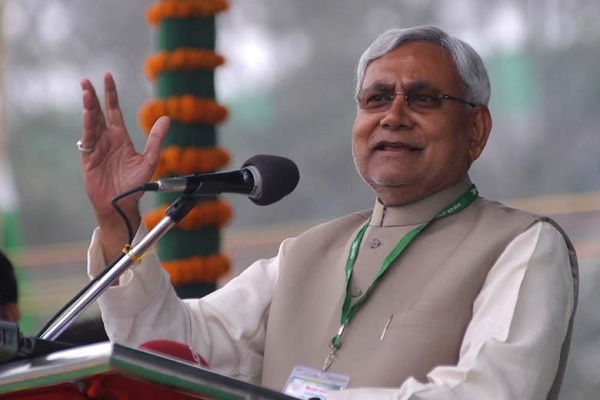
by admin | May 25, 2021 | News

Bihar Chief Minister Nitish Kumar
Patna :(IANS) Amid a political furore over JNUSU president Kanhaiya Kumar’s arrest, Bihar Chief Minister Nitish Kumar on Friday asked the BJP and Prime Minister Narendra Modi to explain their definition of ‘desh-drohi’ (anti-national).
“One week has passed (since Kanhaiya’s arrest) but government agencies concerned have failed to come out with evidence against Kanhaiya. Is it not a fact that the government has no evidence against him? What is the definition of anti-national; please explain it to the people,” Nitish Kumar told the media here.
He said some powerful people were trying to defame and destroy the unique character of JNU, one of the best educational institutions in the country.
“If talking of and slogan-shouting against the hanging of parliament attack convict Afzal Guru and freedom of Jammu and Kashmir are crime and anti-national, why is the BJP again keen to form a government in that state with the Peoples Democratic Party, whose leaders openly opposed the hanging of Guru.”
Nitish Kumar also questioned the meetings of senior Bharatiya Janata Party (BJP) leader Ram Madhav with PDP leader Mehbooba Mufti.
“Is it not a fact that Ram Madhav met leaders of the PDP which openly talked against Guru’s execution and the right to self-determination in Jammu and Kashmir.”
Nitish Kumar asked the BJP to explain to the people what their definition of nationalism was.
“Is it not a fact that the PDP openly hails Afzal Guru as a Shaheed (martyr) but BJP has no problem for sake of sharing power to join hands with them.”
The chief minister said what happened in the wake of incidents on the Jawaharlal Nehru University campus in Delhi “is a part of a deliberate attempt of the Narendra Modi government to divert attention from the poor condition of the country’s economy”.
He said the Rashtriya Swayamsevak Sangh and like-minded organisations were out to destroy the country.
“People like Nathuram Godse (Mahatma Gandhi’s assassin) are being glorified and the BJP leaders are openly attending such functions. No action is being taken against anyone,” the chief minister said.

 Tehran, (IANS) Prime Minister Narendra Modi on Monday said the agenda for economic engagement with Iran and Afghanistan is a priority for India and the Chabahar transport and transit agreement “can alter the course of history” of the region.
Tehran, (IANS) Prime Minister Narendra Modi on Monday said the agenda for economic engagement with Iran and Afghanistan is a priority for India and the Chabahar transport and transit agreement “can alter the course of history” of the region.



